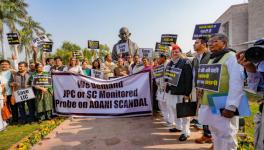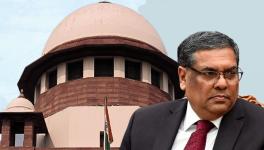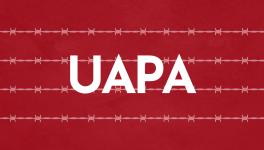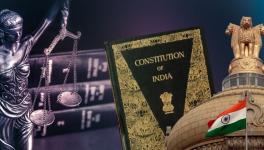What Does the Law Say on the US Adani Bribery Case?

Image Courtesy: Wikimedia Commons
A large Indian conglomerate, Adani Group, and other executives of Adani Green Energy have been charged with serious offences under US laws for a multi-billion dollar alleged fraud.
The United States Securities and Exchange Commission (SEC) claimed on Wednesday that Gautam Adani along with several other defendants had violated the provisions under the US Foreign Corrupt Practices Act of 1977 (FCPA) by offering bribes of more than US $250 million to Indian officials.
In addition, there are allegations that the defendants were also involved in securities and wire fraud, and misrepresentation to procure solar energy supply contracts which were likely to generate US $2 billion in profits for Adani Green Energy over the next 20 years.
The alleged charges concern the US authorities because to raise investments from the US and global investors, Adani Green did not disclose the above facts to US institutions. While Adani Group has denied all the charges against its executives, the matter is still under consideration and the presumption of innocence until proven guilty applies to the above-mentioned defendants.
The Leaflet spoke with Anurag M. Katarki (founder of the Chambers of the Anurag Katarki) and Krati Savita Gautam (senior associate at the Chambers of Anurag Katarki) to discuss a few key legal aspects of the case and simplify the law for those who want to understand the subject better.
Q. What is the maximum and minimum penalty that may be given to the defendants for each of the offences they have been charged with?
A. The US Department of Justice is responsible for the criminal prosecution of FCPA violations.
Under the FCPA, each act of bribery may incur a fine of up to US $2 million (approximately ₹16.8 crore) for corporations or other business entities.
Individuals may receive a lesser fine but may be exposed to the possibility of imprisonment. The penalty for such a violation by an individual such as a director, officer or stockholder of the company includes a fine of up to US $100,000 (approximately ₹84 lakh) and a maximum of five years in prison.
Such individuals may be charged under the accounting provisions as well, whereby, for each violation, the maximum fine is US $25 million (approximately ₹200 crore) for corporations or other business entities and up to US$ 5 million (approximately ₹40 crore) for individuals. Individuals are also subject to a maximum imprisonment of 20 years for each such offence under the accounting provisions.
The court may exercise its discretion under the Alternative Fines Act, 18 U.S.C. 3571(d) to impose a fine up to twice the amount the offender stood to gain if the fine increase is supported by evidence and the offender pleads guilty or is proven guilty beyond a reasonable doubt.
In the present scenario, since it is rumoured that Adani Green was set to earn US $2 billion (approximately ₹16,800 crore) in profits over the next two decades, therefore, the fines may ratchet up to US $4 billion (approximately ₹33,600 crore).
In a civil injunctive action, the SEC seeks a court Order compelling the defendant to obey the law in the future. Violating such an Order can result in civil or criminal contempt proceedings. Civil contempt sanctions, brought by the SEC are remedial rather than punitive in nature and serve one of two purposes: to compensate the party injured as a result of the violation of the injunction or force compliance with the terms of the injunction.
Where a defendant has profited from a violation of law, the SEC can obtain the equitable relief of disgorgement of ill-gotten gains and pre-judgment interest and can also obtain civil money penalties under Sections 21(d)(3) and 32(c) of the US Securities Exchange Act of 1934.
The SEC may also seek ancillary relief (such as an accounting from a defendant). Pursuant to Section 21(d)(5) of the Exchange Act, the SEC may also seek, and any federal court may grant, any other equitable relief that may be appropriate or necessary for the benefit of investors, such as enhanced remedial measures or the retention of an independent compliance consultant or monitor.
Q. Are there any collateral consequences?
A. In addition to the criminal and civil penalties described above, individuals and companies who violate the FCPA may face significant collateral consequences, including suspension, or debarment from contracting with the federal government, cross-debarment by multilateral development banks, and the suspension or revocation of certain export privileges.
Q. Can the defendants settle these offences out of court with the US authorities?
A. Unlike in India, the office of the US Department of Justice has quasi-judicial powers. The justice department may exercise its discretion in resolving the issue at hand without a trial through a negotiated resolution in the form of (i) deferred prosecution agreement; (ii) plea agreement and; (iii) non-prosecution agreement.
In Moog Inc., the SEC ssued notice under Section 21C of the Securities Exchange Act against Moog Motion Controls Private Limited for violating the books and records and internal accounting controls of the FCPA.
Moog had bribed Indian officials to secure business against its competitors which led to unjust benefits of approximately US $504,926. In the expectation of the legal proceedings, Moog offered a settlement that was accepted by the SEC.
Under the FCPA, each act of bribery may incur a fine of up to US $2 million (approximately ₹16.8 crore) for corporations or other business entities.
Q. How long is the trial against the defendants in the Brooklyn court likely to take?
A. At the present moment, it cannot be determined how long the case will drag on.
Moog had bribed Indian officials to secure business against its competitors which led to unjust benefits of approximately US $504,926.
Q. What actions can US authorities take against the defendants after the indictment or during the trial? Could US authorities request for the extradition of the defendants?
A. An extradition treaty is in place between the US and India. The offence is extraditable if punishable under the laws of both contracting parties by imprisonment for more than one year or by a more severe penalty. This applies:
a) whether or not the laws in the contracting State place the offence within the same category of offences or describe the offence by the same terminology;
b) whether or not the office is one for which US federal law requires the showing of such matters as interstate transportation or use of the mail or of other facilities affecting interstate or foreign commerce, such matters being merely for the purpose of establishing jurisdiction in a US federal court; or
c) whether or not it relates to taxation or revenue or is one of a purely fiscal character.
Q. What is the procedure for extradition?
A. It is the standard procedure in such cases. All requests for extradition have to be submitted through the diplomatic channel and supported by required documents, statements and information describing the facts of the offence, statements of the relevant provisions of the law regarding the offence as well as the punishment, a copy of the warrant or the Order of arrest, and such information as would justify the committal for trial of the person in the requested State.
For those already convicted of an offence, an extradition request has also to be supported by a copy of the judgment of conviction or a statement by a judicial authority that the person has been convicted.
In case of urgency, a contracting State may request the provisional arrest the person sought pending proposal of the request of extradition.
Since it is rumoured that Adani Green was set to earn US $2 billion (approximately ₹16,800 crore) in profits over the next two decades, therefore, the fines may ratchet up to US $4 billion (approximately ₹33,600 crore).
Q. Does the indictment indicate any offence under Indian securities law?
A. At present, these are just allegations and the US follows the rule of law to the effect that ‘one is presumed to be innocent until proven guilty’. So it is unlikely that SEBI will act on such allegations.
However, as the matter progresses and if incriminating evidence comes to light, the Securities and Exchange Board of India (SEBI) can commence an investigation under Section 11-C of the Securities and Exchange Board of India Act, 1992 if it has reasons to believe that a transaction is being dealt with in a manner detrimental to the investors or the securities market.
It can very well be argued (if the allegations of corruption with Indian officials are proven) that these dealings unlawfully inflated the profits of the company which in turn led to the rise of the share prices of Adani Green.
Moreover, there may also be investigation, charges and fines inter alia under the Prevention of Money Laundering Act, 2002, Prevention of Corruption Act, 1988, Competition Act, 2002 and allied Rules and regulations.
Q. How did the case against the defendants begin? Did a private citizen file a complaint or did the US authorities begin the proceedings on their own accord? How does such a probe commence?
A. It is not clear whether cognisance was taken suo moto or pursuant to a complaint filed by an individual. Even if it was the latter, it is unlikely the source would be disclosed due to the influential entities or people being involved in the case.
The Principles of Federal Prosecution provide that prosecutors should recommend or commence federal prosecution if the putative defendant’s conduct constitutes a federal offence and the admissible evidence will probably be sufficient to obtain and sustain a conviction unless:
(1) No substantial federal interest would be served by prosecution;
(2) The person is subject to effective prosecution in another jurisdiction; or
(3) An adequate non-criminal alternative to prosecution exists.
In assessing the existence of substantial federal interest, the prosecutor is advised to “weigh all relevant considerations”, including (i) the nature and seriousness of the offense; (ii) the deterrent effect of prosecution; (iii) the person’s culpability in connection with the offense; (iv) the person’s history with respect to criminal activity; (v) the person’s willingness to cooperate in the investigation or prosecution of others; and (vi) the probable sentence or other consequences if the person is convicted.
Get the latest reports & analysis with people's perspective on Protests, movements & deep analytical videos, discussions of the current affairs in your Telegram app. Subscribe to NewsClick's Telegram channel & get Real-Time updates on stories, as they get published on our website.
























